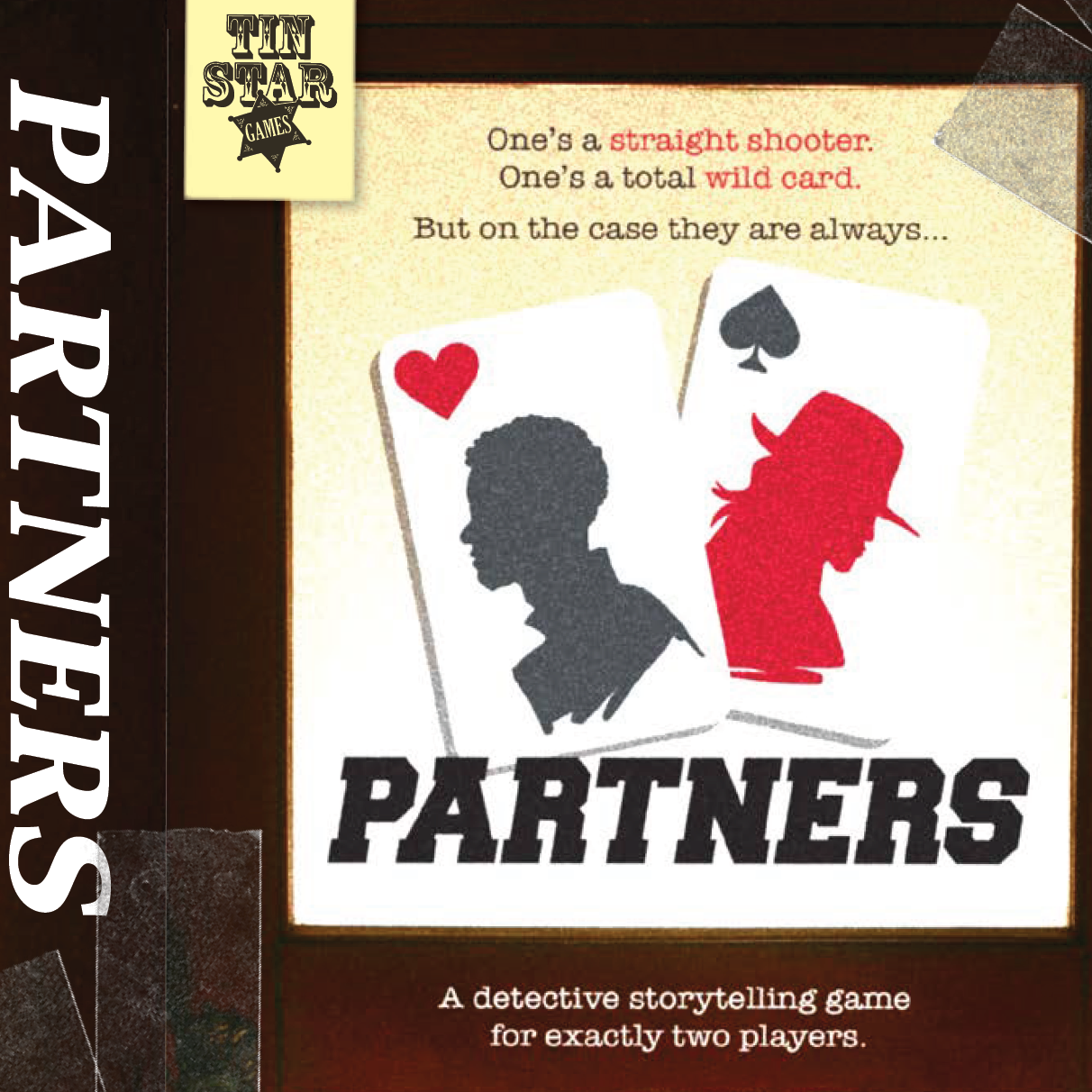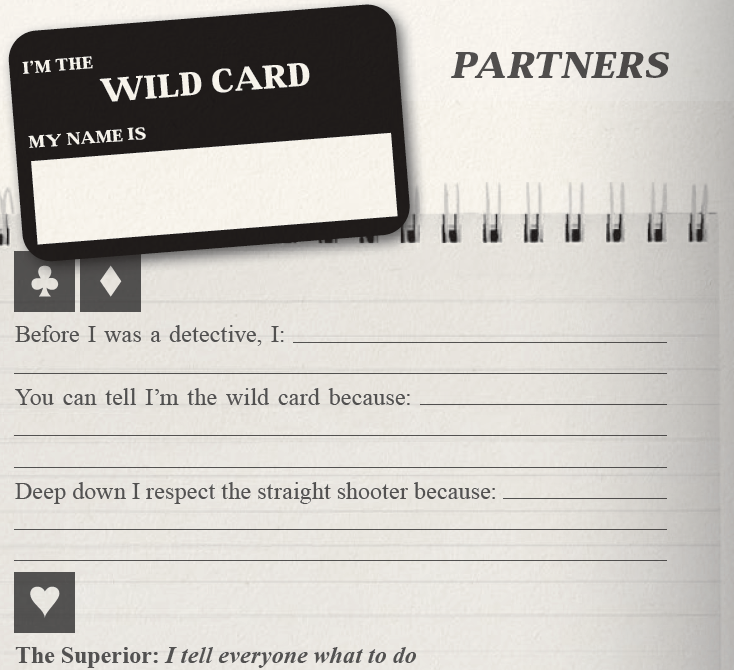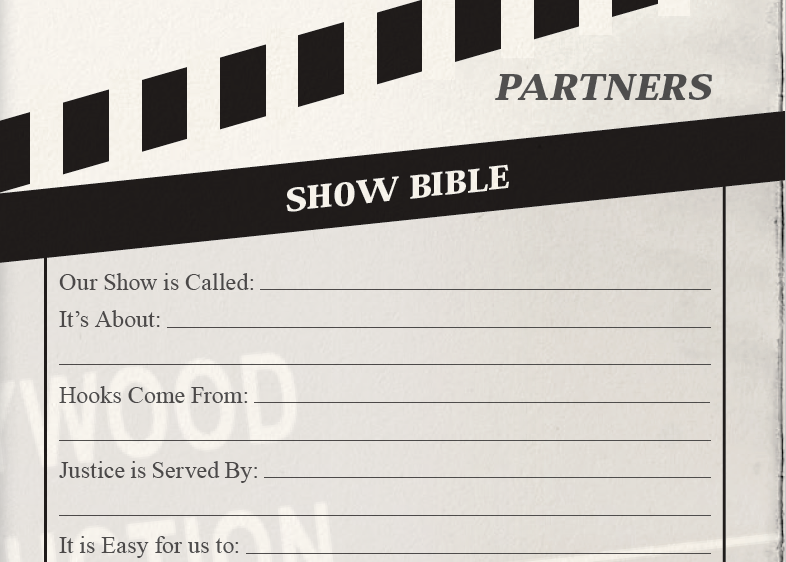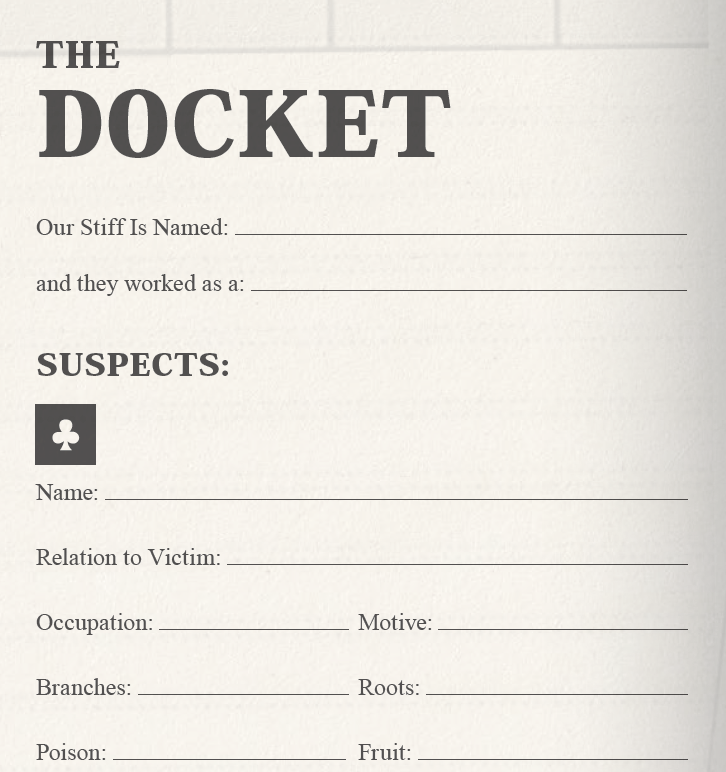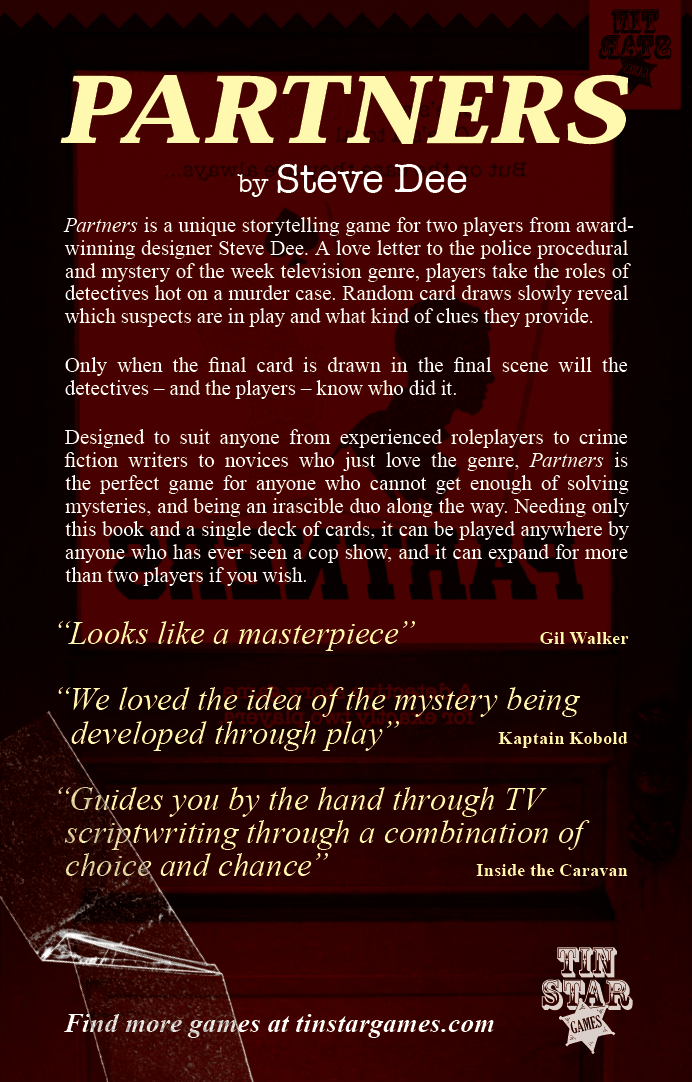With a Keen Eye for Detail...
| Partners | |||||
| Designer(s) | Steve Dee | Artist(s) | Matt Roberts, Greg Pogorzelski, Kristopher Neal McClanahan | Publisher |
Tin Star Games |
| 2 (1-6 optionally) | n/a | ||||
When people think of story games, people tend to only think of RPGs like Dungeons and Dragons, but there is an entire genre of games that have many of those elements that focus primary on the story without getting bogged down in heavy mechanics. This allows for people very new to story games to join in and have fun. This is especially great for children who love telling stories with their vivid imaginations but don't always follow rules well. The game in this review may not be specifically targeted for children, but with a little tweaking to story elements, even it could be played with certain younger audiences.
Partners is a fun storytelling game for two people where they will be creating a murder sitcom, police drama, or something similar. Basically, there will be some sort of murder, a cast of misfit cops/detectives solving the case, fun side stories, the typical suspects, the typical reasons for murder, and a plot twist that could lead to a season long chase. Unlike many traditional story games like Roleplay Games (RPGs), you won't be bogged down in heavy mechanics; you will be focus on building a story with your description language, random elements determined from a deck of cards/random word bank, and a synergy between the players. Make the story as detailed and long as you both wish or make it a one-shot; that is entirely up to you. Will your show be very serious like Law and Order or more silly like Lucifer?
Full disclosure: I have not yet played this game; I plan to do a full review of this game after the Kickstarter. My goal is to provide you an idea of what this game has to offer based on many hours reading over the game, interpreting the rules, and essentially walking through mental episodes of a "show." It is a storytelling game so it is light on the rules and is focused on giving you a framework that guides you through building a story and providing an improv process of telling that story between you and one other person. I have had experience playing many other games in this genre, which is why I am comfortable providing you a preview without fully playing the game yet. I will have a full review up once I have had the chance to play this at the different player counts. Because it is storytelling game, you will know if it is your type of game based on the theme and the overall gameplay style.
Box and Components
I was provided a PDF of this game so I can't speak to the exact quality of the physical book, but since this is just a paperback book, I expect it will be very similar to other RPGs/storytelling games of similar structure. So, I expect it will be like Fiasco, Kobolds Ate My Baby, Dread, Savage Worlds, Kids on Bikes, and so on. The Kickstarter says the final game will be 140 pages.
What is neat is it has been illustrated to look like an old well-read book that has been taped up, had coffee cups sat on it on many pages throughout the book, and the first page has a library checkout log. I am pretty sure there is a lot of random things like this spread out throughout the book, but PDFs are odd with how they load so once I have a physical copy in hand, I will find all of those little Easter eggs. This definitely helps builds the mood for what they are aiming for.
What players will need to supply to play this game is:
- Paper/Pencil (equivalent)
- Copy of the Role Sheets from the book
- Copy of Episode and Docket Sheet for the episode
- Standard deck of playing cards (just the base 52 cards)
- A random word generator website or application
Here is a sample of what you will end up with; there are additional sheets you can print off as well in the back of the book. I am not sure if copies of these will be available on their website or not. I will find out and will provide those links in the final review if so.
Mechanics
The game is built for two players so everything will be focused on that, but I will mention later in the preview how you can include additional players but not in great detail.
One way the game is randomly generated is by use of a deck of cards. Throughout the book, there will be Card Tables with either card suits or card values along with a predetermined response. In some cases, you can come up with your own response; in other cases, you are expected to use the response from the table. This is similar to other games using tables where you use dice roll or use a random number generator.
There are also times players will need to reference a random word bank to use in sentences. This is a fun little improv exercise that make the scenes a lot of fun. A website, phone app, or even a dictionary are all acceptable for this purpose.
Intro Reel 
The first thing players will do is create the characters that will be the stars of this show. There will be two main characters each with their own characteristics:
- Straight Shooter: Are very empathetic and seem to have a strong sense of justice for people. Very likely to act on their feelings.
- Wild Card: Essentially everything the Straight Shooter is not. They only do things that they want to do when they get the urge or find something particularly interesting. It is hard to read how they will react during any situation. The Wild Card will also use Random Words from time to time during the case that is entirely unrelated, which will annoy the Straight Shooter but somehow offers strange insight at the same time leading to a break in the case.
I think a good example of these characters would be the BBC version of Sherlock. Sherlock is definitely the Wild Card only doing things when it is mentally stimulating as opposed to Watson who wants to help people and often gets involved even when it puts himself in harm's way. The book also goes through other good examples as well, but to me, this is one of the clearest examples of those roles.
While these characters are initially created by one person, players will be able to swap and flex their acting skills in between episodes. Each of you will go through the respective role sheets and fill out the first three questions separately (do not share details until you are all done). You don't have to go into too much detail as you can add to the details with your portrayal of the character during the gameplay. The rest of the questions will be answered in the next steps.
Swap Role Sheets and create one of secondary character for the other Role Sheet. Secondary Characters for the Straight Shooter are the Subordinate and the Touchstone; the Secondary Characters for the Wild Card are the Superior and the Oddball.
Swap Role Sheets and create the final secondary character on each sheet.
Finish up the details for the show by naming the show, listing the characters, and any of the finer details you want to add for flavor; this is where you will fill out the Show Bible sheet. The book will provide you the option to either come up with your own answers or use the Card Table to receive a pre-determined answer.
This step should be done until you create a brand-new show with new characters (or maybe a new season and a lot has changes).
The Case of the... 
This is where you build up the contents of each episode. The game will provide a framework with how each case will be structured, but things are random and can be altered by the players to fit whatever format they want their show to be. At the beginning of each episode, players will randomize the following details:
- The murder victim
- The method for murder
- The four main suspects
This is where you will fill out all of the details for the Docket form. This will use the Card Table method as described earlier; the suit will not be important at this step.
Murder is afoot
Most good show are broken up into four acts.
- Act 1: The body is body is found, the case is opened, and the suspects are identified.
- Act 2: Deeper analysis of the victim's life, the less important suspects, evidence reviewed, and the puzzle begins.
- Act 3: Suspects acting strangely, suspects motives are failing, stories beginning to contradict putting pressure on suspects, and now only one or two suspects remain likely.
- Act 4: Pressure hits an all-time high and eventually the killer is revealed perhaps due to desperate/foolish actions. Plot twists are revealed.
Each act will have a series of scenes, which will involve players taking turns building the scene for each other; each episode will have a total of 12 scenes spread across the 4 acts. Players are given random elements for the scene based on drawn cards against the Card Table.
During scenes, the first person (primary) will describe what is around and what has happened, and the other player (secondary) can react to the scene and add elements. Depending on their "role," what is described should be based on what that character would be interested in and if they cared enough to focus in on certain clues. Players can continue adding to the scene as the "secondary" role back and forth until they feel the scene has been fully developed. They can either take notes of the scene and move on, or they can dive into their characters and act it out. This is where the flexibility of a story-based system truly shines; make it your own.
In future scenes, the players will swap primary and secondary roles to ensure both get equal opportunity to build the initial scene.
In addition to solving the mystery, there will be the B-plot that will have you interacting with the secondary characters that were built during character creation as well as other characters that may be randomly selected based on the Card Tables. The book runs you through the basic format of these cases, these B-plots, the tables to randomly generate the individuals, and situations that occur during each scene, but I will save that for our full review of the game.
Next Week 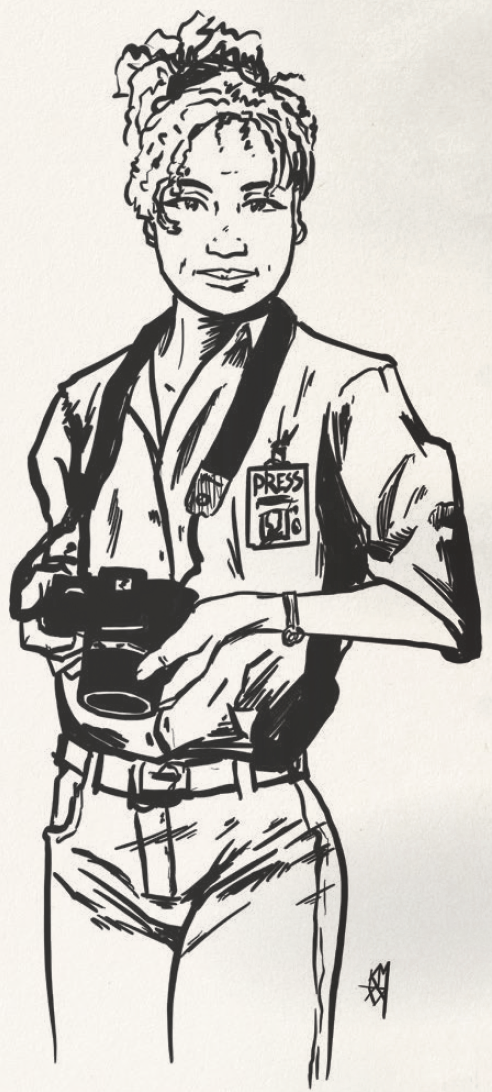
As with any storytelling game, you decide how long it will go on. You want to tell a full story to have a satisfying start and finish, but that can be just a few sessions or it can go on for quite some time. It really comes down to those who are playing and what they want out of the game. The important thing is to keep track of what happened during each session, important characters, unanswered questions that need answered, and potential characters that could pop back up for multiple purposes (suspects, victims, allies). There are optional sheets in the book you can print off to keep track of all of these details as well. The book provides the details of how to proceed if you wish to continue the season with more episodes.
Rating System
Anytime you play a storytelling game, you need to be sure that everyone is having a good time and is onboard with the topics that are discussed. This is certainly not something unique to this game but is something I wanted to point out because they do cover it in their unique way. Terms like Lines and Veils (or Walls and Curtains) refer to topics players either don't want to discuss at all or are comfortable lightly referencing without going into detail or having the scene fade as those topics may begin. It is especially important to go over what people's lines and veils are before beginning any storytelling game with a new group. The best way to handle this is by handing everyone a sheet of paper and asking everything to write at least one thing for each topic and turning them back into the Game Master. They will shuffle them up and read them aloud and keep a running list of these Lines and Veiling and will ensure everyone is respecting those limitations during gameplay. Obviously, in Partners, this is more of a discussion between the two players.
More Players?
If you really don't want to play with 2 players, you can play with some of the optional rules.
Ensemble Mode (3~4 players)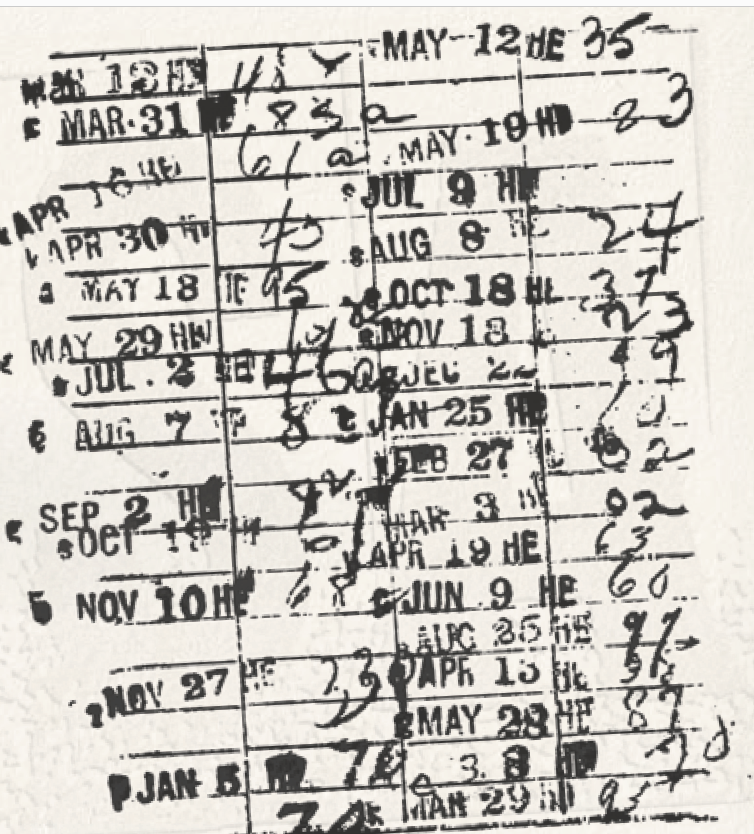
You will have one player as the Straight Shooter and another player as the Wild Card; the rest of the players will play as the "Rest of the Roster." This is a great intro option when you have 1-2 stronger players and want to dip the toes of newer players into the storytelling game. The Rest of the Roster will help add to the story in certain scenes.
Team Mode
Players split off into teams where teams of Straight Shooters and the Wild Cards; only one player from each team steps up to be the speaker for that role at a time. The speaker for each team changes between scenes.
Pass the Mic Mode
Similar to Team Mode, players form a "line" and in between scenes, the next players in line step into the roles. This means players may be swapping roles very often. This is definitely a major exercise in improv and requires players to keep track of the story and multiple character elements.
Final Thoughts
I certainly didn't cover everything the game provides; I will cover much more in the full review in a few months once I have had more time to get games in with friends as gatherings are permitted again. I feel this provides a good idea of what they have to offer to help you decide if it is something you would be interested in looking into.
I really like the look of this game. While I would be disappointed to have actual tape on the outside of my game, I sort of want it at the same time. They have put a lot of effort into making the game really fit the theme they are targeting. Looking over their website, this is certainly not their first storytelling game; so, if you like the sound of this game, be sure to check out their Kickstarter or one of the other games on their website.
I like that they have really spent a lot of time breaking down the elements of the cop/mystery genre. They make a lot of relevant references to help drive home the points they are trying to make. This would be an interested read even outside of being a fun storytelling game. They provide a lot of pre-made character samples as well to help those who aren't sure how to get started so it is very approachable by those of all experience levels.
If you like storytelling games (or like the concept of this genre) but don't like getting bogged down in heavy mechanics like D&D or Pathfinder OR maybe you really like shows like NCIS, Law and Order, CSI, Bones, Lucifer, Sherlock, Detective Conan, and one of the literal dozens of shows/anime like them, this may be a game you may really enjoy.
Partners is hitting Kickstarter on April 9th, 2021. Check it out if you enjoy a good story telling game.
Links/Media
Disclosure
We received the product in order to write an honest review; all reviews reflect the honest opinions of the writer.
All images from this article were taken from the PDF of the book and are the respective works of the artists.

